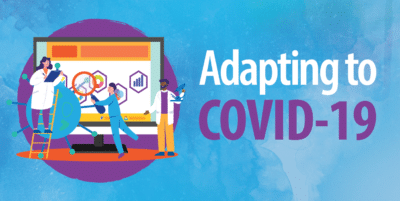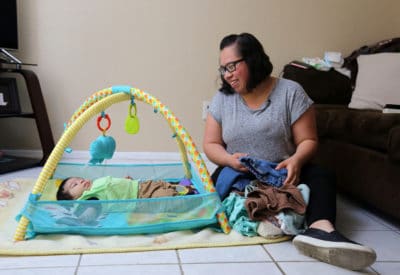 Around the country and the world, researchers are using LENA SP, our tool for researchers, to collect and analyze data about children’s language environments. We spoke with two research teams to learn more about how they have adapted their data collection processes during the coronavirus pandemic.
Around the country and the world, researchers are using LENA SP, our tool for researchers, to collect and analyze data about children’s language environments. We spoke with two research teams to learn more about how they have adapted their data collection processes during the coronavirus pandemic.
Project: Brain and Early Experience (BEE) Study
Location: University of North Carolina Brain and Early Experience Lab
At UNC Chapel Hill, a team of researchers is conducting the Brain and Early Experience (BEE) Study to learn more about how experiences early in life, including early language exposure, influence children’s brain development.
“Understanding how early experiences help to shape the brain during infancy is important for improving children’s long-term physical, emotional, and behavioral health,” lab team member, speech-language pathologist, and doctoral student Marie-France Perrier explained. “This study will provide valuable information that we hope will inform future programs to help parents and educators better support children’s early brain development and their long-term health.”
When the pandemic struck, the team significantly changed their approach to collecting data with LENA in order to mitigate risk. First, they transitioned from home visits to video calls, which required a new set of instructions for participating families. To accommodate these remote visits, they began mailing packages to participants with study materials such as the LENA vest and LENA device. The team also set up new protocols for cleaning and sterilizing the materials, such as:
- Giving packages time to rest after they are mailed back to the lab by participants;
- Following a sterilizing, cleaning, and laundry protocol. (For example, they determined the following plan for washing LENA vests: Wear gloves and wash the vests in the warmest water setting. Use an extra rinse, and add Lysol laundry sanitizer and vinegar. Disinfect the hamper afterwards.)
These adaptations have allowed the team to continue to collect LENA data, which is critical to the ongoing success of the three-and-a-half-year longitudinal BEE study.
“It’s been extremely helpful to continue to collect LENA data remotely, as other parts of our study — such as collection of MRI imaging data — are currently on hold,” Perrier said. “LENA has enabled us to continue to collect data remotely, not only in the context of the pandemic, but also to facilitate collaborations with offsite lab team members, collaborators, and affiliates.”
The team plans to continue the study while following federal and UNC Chapel Hill internal COVID-19 restrictions and guidance. The team is currently conducting remote visits with participating children who are six months old and 18 months old and plans to continue using LENA data collection at the 27-month visit as well.
Project: Buddy Study
Location: Teachers College, Columbia University
The Buddy Study, a project headquartered at Teachers College, Columbia University, is a longitudinal study of 200 socioeconomically diverse moms designed to investigate various predictors of child development, such as a family’s socioeconomic status and the child’s home language environment.

When COVID-19 began spreading across the United States, the team had completed about half of their recruitment, with 93 families enrolled in the study.
“As soon as the university shut down, research activities had to pivot really quickly,” she explained. “With a big longitudinal study we didn’t want to lose our sample, but we also didn’t want to put anyone at risk. We still wanted to get as much data as possible, so we pivoted to digital data collection strategies.”
Among the useful tools for remote data collection was LENA technology. The team mailed out LENA shirts and devices to the participating families and connected on video calls to teach them how to use the equipment. When families mailed the items back, the team wore PPE and washed the clothing and wiped devices down with sanitizing wipes. Troller-Renfree’s tips for collecting data during the COVID-19 outbreak include:
- Add tracking information to envelopes with LENA materials. The mail system is experiencing significant delays, and tracking information will help determine exactly where materials are. Consider purchasing extra LENA devices, as some may be stuck in transit via the mail for weeks or months.
- Print out bright reminders to encourage families to return the LENA clothing with the device.
- Strategize a comprehensive plan for communications. Be where your participants are digitally, whether it’s Instagram or WhatsApp. Parents aren’t by their phones or email like they used to be when they were working in the office. Having multiple touchpoints will help you maintain an accurate database of participant information during a time of upheaval and transience.
The team also began using the Developmental Snapshot to better understand how children’s development was progressing, from afar. They found that sharing the Snapshot data and components of the LENA report detailing the home language environment was a helpful tool to keep parents interested and engaged in the study.
"It’s incredibly important to understand what impacts stressful events, like pandemics, mean for child development. We’re working hard to characterize what’s changing in the home and how that’s impacting children. A lot of knowledge can be found from natural experiments like this.”
-Sonya Troller-Renfree
The team was motivated to continue the study during the pandemic in order to maintain their NIH funding and to capitalize on the opportunity to investigate a once-in-a-lifetime developmental phenomenon.
“This is an incredibly interesting and unprecedented time,” Troller-Renfree explained. With parents spending more time at home with their children and limiting contact with others, infants are experiencing different socialization than they would have during pre-pandemic times.
“It’s all going to have an effect on the developing child. It’s incredibly important to understand what impacts stressful events, like pandemics, mean for child development,” Troller-Renfree said. “We’re working hard to characterize what’s changing in the home and how that’s impacting children. A lot of knowledge can be found from natural experiments like this.”
She noted that the moms in the study have been very excited to participate, and the regular check-ins with families have been good for both the parents and researchers alike.
“This is a strange, lonely, and isolating time. Many of our moms have been extra gung ho, and I think part of it is having that opportunity to chat with someone who is interested in their baby. They are very much aware that this is a weird time and that by participating in the scientific process they’re helping their kids in the long term,” she said.
Next year, the team plans to continue following their current cohort and restart recruitment if possible. They will also consider using LENA technology in the Baby’s First Years study to assess language remotely if there are still restrictions around bringing families into the lab.



